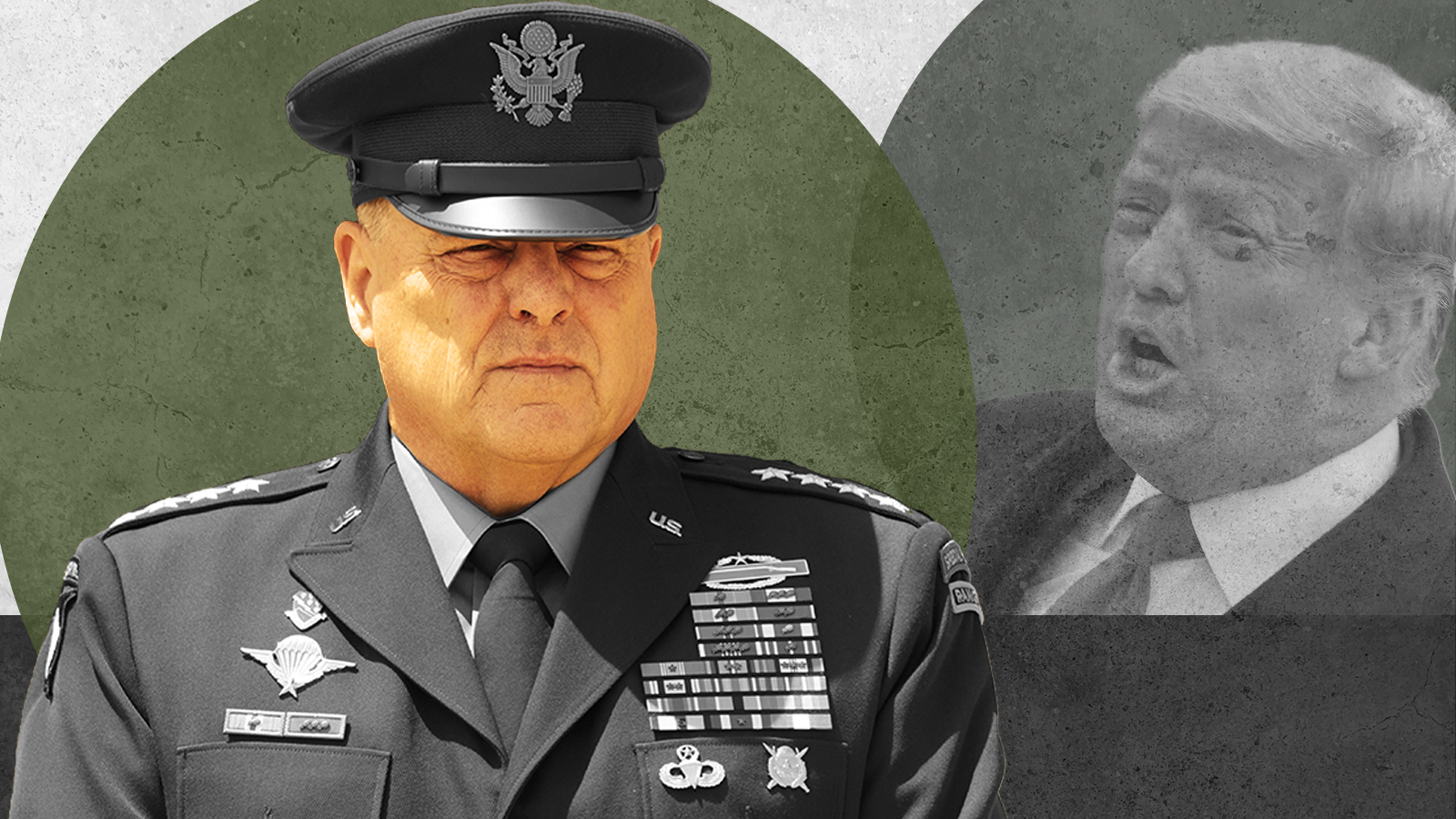The generals shouldn't need to be involved


A free daily email with the biggest news stories of the day – and the best features from TheWeek.com
You are now subscribed
Your newsletter sign-up was successful
The sudden flood of books about the tumultuous last days of Donald Trump's presidency have brought a renewed focus to the role of Gen. Mark Milley, then as now the chairman of the Joint Chiefs of Staff. Milley reportedly worried that Trump's efforts to overturn the election results could be a "Reichstag moment," and spent the months between the election and Inauguration Day working to ensure a successful transition of power. He warned Pentagon commanders to refuse any illegal order from Trump, and assured nervous Democratic lawmakers that the military wouldn't be part of the outgoing president's machinations.
"They may try, but they're not going to f***ing succeed," Milley reportedly said. "You can't do this without the military. You can't do this without the CIA and the FBI. We're the guys with guns."
Mostly, Milley's story is about how the American constitutional system survived this time, thanks to a few people and institutions that held the line against a ferocious (if largely incompetent) assault. But it is also a story of slippage and decay. If the military is having to choose which side it will take during a transition of power — even if it's just a choice about whether to follow the rule of law — we're already a significant step removed from stable democracy.
The Week
Escape your echo chamber. Get the facts behind the news, plus analysis from multiple perspectives.

Sign up for The Week's Free Newsletters
From our morning news briefing to a weekly Good News Newsletter, get the best of The Week delivered directly to your inbox.
From our morning news briefing to a weekly Good News Newsletter, get the best of The Week delivered directly to your inbox.
Simply put, the armed forces aren't supposed to be kingmakers. Milley and the Pentagon didn't end up acting in that role after the 2020 elections, and there's no evidence they wanted it, but — in confronting the question of how to act if Trump tried to retain power — they moved incrementally closer to taking on the responsibility. In our democracy, the military is supposed to be subordinate to elected civilian leadership. (The Founders were very concerned about the possibility of an armed, tyrannical government.) If the generals play a role in deciding who those leaders will be, that delicate-but-critical dynamic is upended.
All of this is not the Pentagon's fault. Trump's actions, and his party's failure to check him, created the dilemma. Milley and his colleagues across the armed forces made the right decision in siding with the election results. That they felt the need to consider it at all means once-bright lines have already blurred.
A free daily email with the biggest news stories of the day – and the best features from TheWeek.com
Joel Mathis is a writer with 30 years of newspaper and online journalism experience. His work also regularly appears in National Geographic and The Kansas City Star. His awards include best online commentary at the Online News Association and (twice) at the City and Regional Magazine Association.
-
 A dreamy long weekend on the Amalfi Coast
A dreamy long weekend on the Amalfi CoastThe Week Recommends History, pasta, scenic views – this sun-drenched stretch of Italy’s southern coast has it all
-
 Can foster care overhaul stop ‘exodus’ of carers?
Can foster care overhaul stop ‘exodus’ of carers?Today’s Big Question Government announces plans to modernise ‘broken’ system and recruit more carers, but fostering remains unevenly paid and highly stressful
-
 6 exquisite homes with vast acreage
6 exquisite homes with vast acreageFeature Featuring an off-the-grid contemporary home in New Mexico and lakefront farmhouse in Massachusetts
-
 Trump’s EPA kills legal basis for federal climate policy
Trump’s EPA kills legal basis for federal climate policySpeed Read The government’s authority to regulate several planet-warming pollutants has been repealed
-
 House votes to end Trump’s Canada tariffs
House votes to end Trump’s Canada tariffsSpeed Read Six Republicans joined with Democrats to repeal the president’s tariffs
-
 Bondi, Democrats clash over Epstein in hearing
Bondi, Democrats clash over Epstein in hearingSpeed Read Attorney General Pam Bondi ignored survivors of convicted sex offender Jeffrey Epstein and demanded that Democrats apologize to Trump
-
 Judge blocks Trump suit for Michigan voter rolls
Judge blocks Trump suit for Michigan voter rollsSpeed Read A Trump-appointed federal judge rejected the administration’s demand for voters’ personal data
-
 US to send 200 troops to Nigeria to train army
US to send 200 troops to Nigeria to train armySpeed Read Trump has accused the West African government of failing to protect Christians from terrorist attacks
-
 Grand jury rejects charging 6 Democrats for ‘orders’ video
Grand jury rejects charging 6 Democrats for ‘orders’ videoSpeed Read The jury refused to indict Democratic lawmakers for a video in which they urged military members to resist illegal orders
-
 Big-time money squabbles: the conflict over California’s proposed billionaire tax
Big-time money squabbles: the conflict over California’s proposed billionaire taxTalking Points Californians worth more than $1.1 billion would pay a one-time 5% tax
-
 Trump links funding to name on Penn Station
Trump links funding to name on Penn StationSpeed Read Trump “can restart the funding with a snap of his fingers,” a Schumer insider said
